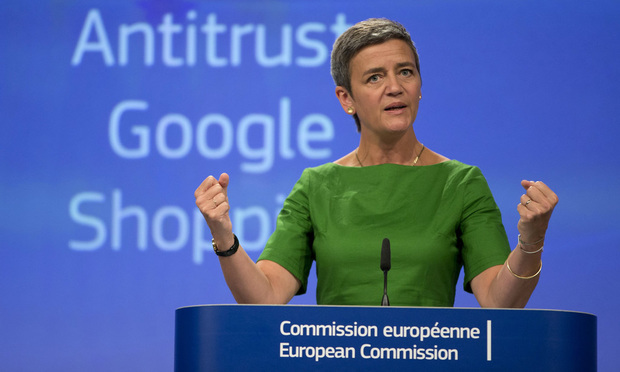EU Slaps Google With $1.7BN Antitrust Fine
This marks the third billion-dollar penalty European regulators have imposed on the tech giant for hindering competition.
March 20, 2019 at 02:49 PM
5 minute read
 European Union Commissioner for Competition Margrethe Vestager. (AP Photo/Virginia Mayo)
European Union Commissioner for Competition Margrethe Vestager. (AP Photo/Virginia Mayo)
The European Commission has fined Google €1.49 billion ($1.7 billion) for abusing its dominant position in the market for online advertising – the third billion-dollar penalty it has imposed on the tech giant for hindering competition.
Announcing the fine, Margrethe Vestager, the E.U.'s antitrust czar, said Google had violated antitrust rules by shutting its competitors out of the market for online search advertising, by imposing restrictions on companies that used its search bar on their websites in Europe. Google had unfairly required websites that used its search bar to feature ads from Google's advertising services over those of rivals.
"The €1.49 billion reflects the serious and sustained nature of Google's infringement," Vestager said. "The misconduct lasted over 10 years and denied other companies the possibility to compete on the merits and to innovate."
Google stopped the practice after the regulator sent it a statement of objections in July 2016.
After the fine was announced on Wednesday, Google said in a tweet that "healthy, thriving markets are in everyone's interest."
Regulators in the E.U. have been much more aggressive in their approach to large technology companies than their U.S. counterparts when it comes to anti-competitive practices, data protection and tax issues. They are now seen by many governments as a global model, as more try to rein in the power of the tech giants of Silicon Valley.
The fine in this case came as a result of an investigation into the market for brokering online search advertising. Through its Adsense business, Google serves as a broker between advertisers and website owners that want to profit from the space around search engine results. But according to the commission, Google blocked its rivals from placing advertisements on third-party websites by imposing exclusivity clauses in AdSense contracts.
The commission found that Google was the biggest player in online search advertising intermediation in the European Economic Area (EEA) – the 28 countries of the EU plus Norway, Iceland and Liechtenstein – with a market share above 70 percent from 2006 to 2016.
In 2016, Google also had a market share of above 90 percent in the national markets for general search, and above 75 percent in most of the national markets for online search advertising.
"Google is by far the biggest advertising broker," Vestager said. "Google's rivals were unable to grow and compete. Websites and owners of websites had limited options for selling space on their websites other than Google."
The commission found that Google was able to shut out competitors such as Microsoft and Yahoo. It investigated about 200 agreements between Google and the most commercially important website publishers. It found that the agreements contained clauses that restricted publishers from using search advertisements from Google's competitors in their search results.
In 2009, Google replaced these exclusivity clauses with "premium placement" clauses that required publishers to reserve the most prominent space in their websites for Google's advertisements in their search results. Google also required publishers to seek written permission to make changes in the way competitors' advertisements were displayed, the commission said. This effectively gave Google control over its rivals' ads.
"There was no reason for Google to include these clauses in their contracts except to exclude rivals, Vestager said.
Vestager ordered Google to end all such restrictive clauses and commit to not introducing clauses with similar effect in the future.
The European Commission has now fined Google a total of €8.25 billion ($9.4 billion) for anti-competitive practices. The commission can fine a company it finds guilty of illegal conduct up to 10 percent of its global turnover.
Vestager said measures that the commission had taken against Google for antitrust abuses had yielded positive results. Referring to a ruling against Google in June 2017 that the search company had favoured its own results in online shopping searches, Vestager said Google's rivals now had 70 percent of the market compared to 30 percent two years ago.
She also highlighted a ruling from July 2018 that Google had abused its market position to require mobile-phone makers to install Android and Google apps on their handsets. Vestager said mobile-phone makers were now able to strike contracts with other developers to install their apps.
"We've always agreed that healthy, thriving markets are in everyone's interest," Google tweeted after the announcement. "We're pleased that @EU_Commission recognises our efforts to comply with its rulings, and the changes we're making in coming months to give more visibility to rivals in Europe."
Google also said it would now allow users in Europe to switch to another web browser and search engine on Android. It also said that in order to allow for more competition when customers shop with Google, it would give other shopping sites more prominence in its search results.
Related Stories:
Seven Times Europe Has Made US Tech Companies Pay Up Over Legal Issues
Massive $5B Fine Against Google Highlights Long-Term Shift in EU, US Antitrust Enforcement
This content has been archived. It is available through our partners, LexisNexis® and Bloomberg Law.
To view this content, please continue to their sites.
Not a Lexis Subscriber?
Subscribe Now
Not a Bloomberg Law Subscriber?
Subscribe Now
NOT FOR REPRINT
© 2025 ALM Global, LLC, All Rights Reserved. Request academic re-use from www.copyright.com. All other uses, submit a request to [email protected]. For more information visit Asset & Logo Licensing.
You Might Like
View All

Jones Day, BCLP & Other Major Firms Boost European Teams with Key Partner Hires
4 minute read
$13.8 Billion Magomedov Claim Thrown Out by UK High Court
Trending Stories
- 1South Florida Attorney Charged With Aggravated Battery After Incident in Prime Rib Line
- 2'A Death Sentence for TikTok'?: Litigators and Experts Weigh Impact of Potential Ban on Creators and Data Privacy
- 3Bribery Case Against Former Lt. Gov. Brian Benjamin Is Dropped
- 4‘Extremely Disturbing’: AI Firms Face Class Action by ‘Taskers’ Exposed to Traumatic Content
- 5State Appeals Court Revives BraunHagey Lawsuit Alleging $4.2M Unlawful Wire to China
Who Got The Work
J. Brugh Lower of Gibbons has entered an appearance for industrial equipment supplier Devco Corporation in a pending trademark infringement lawsuit. The suit, accusing the defendant of selling knock-off Graco products, was filed Dec. 18 in New Jersey District Court by Rivkin Radler on behalf of Graco Inc. and Graco Minnesota. The case, assigned to U.S. District Judge Zahid N. Quraishi, is 3:24-cv-11294, Graco Inc. et al v. Devco Corporation.
Who Got The Work
Rebecca Maller-Stein and Kent A. Yalowitz of Arnold & Porter Kaye Scholer have entered their appearances for Hanaco Venture Capital and its executives, Lior Prosor and David Frankel, in a pending securities lawsuit. The action, filed on Dec. 24 in New York Southern District Court by Zell, Aron & Co. on behalf of Goldeneye Advisors, accuses the defendants of negligently and fraudulently managing the plaintiff's $1 million investment. The case, assigned to U.S. District Judge Vernon S. Broderick, is 1:24-cv-09918, Goldeneye Advisors, LLC v. Hanaco Venture Capital, Ltd. et al.
Who Got The Work
Attorneys from A&O Shearman has stepped in as defense counsel for Toronto-Dominion Bank and other defendants in a pending securities class action. The suit, filed Dec. 11 in New York Southern District Court by Bleichmar Fonti & Auld, accuses the defendants of concealing the bank's 'pervasive' deficiencies in regards to its compliance with the Bank Secrecy Act and the quality of its anti-money laundering controls. The case, assigned to U.S. District Judge Arun Subramanian, is 1:24-cv-09445, Gonzalez v. The Toronto-Dominion Bank et al.
Who Got The Work
Crown Castle International, a Pennsylvania company providing shared communications infrastructure, has turned to Luke D. Wolf of Gordon Rees Scully Mansukhani to fend off a pending breach-of-contract lawsuit. The court action, filed Nov. 25 in Michigan Eastern District Court by Hooper Hathaway PC on behalf of The Town Residences LLC, accuses Crown Castle of failing to transfer approximately $30,000 in utility payments from T-Mobile in breach of a roof-top lease and assignment agreement. The case, assigned to U.S. District Judge Susan K. Declercq, is 2:24-cv-13131, The Town Residences LLC v. T-Mobile US, Inc. et al.
Who Got The Work
Wilfred P. Coronato and Daniel M. Schwartz of McCarter & English have stepped in as defense counsel to Electrolux Home Products Inc. in a pending product liability lawsuit. The court action, filed Nov. 26 in New York Eastern District Court by Poulos Lopiccolo PC and Nagel Rice LLP on behalf of David Stern, alleges that the defendant's refrigerators’ drawers and shelving repeatedly break and fall apart within months after purchase. The case, assigned to U.S. District Judge Joan M. Azrack, is 2:24-cv-08204, Stern v. Electrolux Home Products, Inc.
Featured Firms
Law Offices of Gary Martin Hays & Associates, P.C.
(470) 294-1674
Law Offices of Mark E. Salomone
(857) 444-6468
Smith & Hassler
(713) 739-1250









